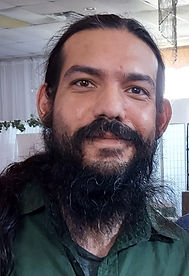Striving for a better world.

Quick Bio

Mike Phillips (mike the human) is a multidisciplinary quantitative researcher. He is trained in theoretical physics, having finished his Ph.D. in December 2016. He is currently a Postdoctoral Fellow in Biophysics with the group of Kingshuk Ghosh at the University of Denver (DU). He previously taught various physics classes at Central New Mexico Community College (CNM). For more about research activities and scientific interests, see 'Professional'.
Mike is highly proficient in mathematics (including calculus, probability and statistics, differential equations, group theory), and coding (Python, Mathematica, C++, Java, bash/zsh). He also has some lab and electronics experience (PMT, FPGA).
In any spare time, Mike might play guitar, explore science fiction stories, or read something interesting.
Selected list of recommended reading:

Personal History
I don't like to share too much personal information, but I am glad to share some of my personal history. It gives some insight into my motivations, and demonstrates my resiliency.
Early Years (up to age 18)
Sparing many details, my early life was especially unusual, and gave me ample opportunity to see from many perspectives. During those first seventeen years, I relocated at least six times, to a new residence each time, and lived with a total of over ten different extended family members (at various times). Consequently, I attended six different public schools spanning three cities and two states. Still, I did quite well in my studies. Situations may change, but I always adapt and find a way to learn and contribute.
My family always managed to carve out a good life, but was never wealthy. So I was incredibly grateful that they found a way to fund my travel to Europe, on a group trip organized by my high school. I returned from the trip ready to begin my senior year, a busy course schedule full of advanced placement (AP) classes, but found that I had gotten quite ill. After some blood tests, I found out I had end stage renal failure.
The origin of my kidney problems was (and is) not clear. [Though may be related to a high fever I experienced prior to my travels.] Nevertheless, I needed to begin treatment immediately and attend to my health first, which meant missing essentially half of my senior year. When I returned, my schedule was beyond busy: I was working extra hard to make up for lost time in all of my AP classes, I had to take two classes during night school on Tuesday and Thursday nights in order to graduate on time, and I needed to receive dialysis treatments on remaining weeknights.
Later Years (age 18 and up)
Somewhat to my surprise, I actually made it to high school graduation and even received an award for achievement in mathematics. I also earned college credit based on (most) of my AP test scores. So I entered the University of New Mexico quite strong, initially majoring in mechanical engineering. I soon switched to double majoring in physics and applied math, after careful examination of the coursework and consideration of what I really wanted to learn.
My medical difficulties had not concluded, though. I had to take a leave from the university so that I could receive and recover from a kidney transplant, instead of attending my first Spring semester. With a successful operation completed, I re-entered the university that Summer and went on to finish my double major in a total of five years. Along the way, I worked as a tutor for two semesters, then joined a particle physics lab and worked on various projects there for two years. When I have a goal, like learning all I can about physics or earning my double major bachelor's degree, I will reach it no matter the circumstances.
While often reminded of my medical history, it was no longer such a tenuous situation by the time I was considering graduate school. Fueled by the focus on many-body interactions, fascinating new technologies, and wide applicability, I aimed to study theoretical condensed matter physics. More about my research can be found in other areas of this site. Personally, my PhD studies and dissertation represent a huge success -- I managed to overcome my medical difficulties and financial shortcomings to enter the "ivory tower," sharpen my hard and soft skills, and complete several challenging theoretical projects.
Now, I intend to use my scientific training to benefit society at large. Details about my interests, career aspirations, and motivations can be found elsewhere on this site. I am very interested in concrete applications of my skillset to drive society forward, whether in research or other areas.